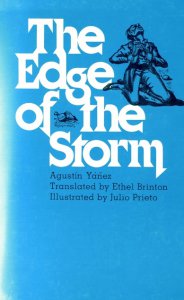This tale of a repressive priest and his small Mexican village during the eighteen months preceding the Revolution of 1910 is a great novel, one that exposes the struggle between human desire and paralyzing fear—fear of humanity, fear of nature, fear of God. Agustín Yáñez probes the actions of people caught in life's currents, enthralling his readers with mounting dramatic tension as he shows that no power can forge saints from the human masses, that any attempt to do so, in fact, often has exactly the opposite result. Yáñez brings to his work a deep understanding of people—his people—and he illuminates a great truth—that no one, anywhere, seems very strange when we understand the environment that has produced him or her.
AGUSTÍN YÁÑEZ (1904—1980), recognized as one of Mexico's greatest novelists, was long a leading figure in the cultural and political life of his country. He wrote seventeen books and held numerous political offers, including Governor of Jalisco and Secretary of Public Education.




